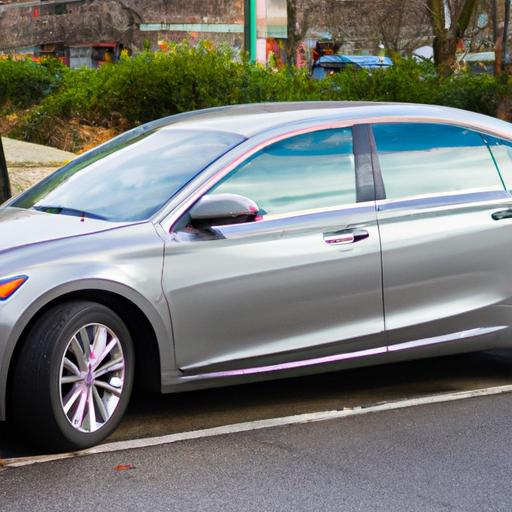Introduction
Are you in the market for a new car and wondering about the transmission options available? Well, let me introduce you to Continuously Variable Transmission (CVT). In the world of automotive engineering, CVT has gained significant popularity in recent years. But what exactly is CVT, and why is it important to understand which cars have this transmission?
Continuously Variable Transmission, or CVT, is an innovative type of automatic transmission that offers a seamless driving experience. Unlike traditional transmissions with fixed gear ratios, CVT utilizes a system of belts and pulleys to provide an infinite number of gear ratios. This unique design enables the engine to operate at its most efficient range, optimizing fuel economy and delivering a smooth ride.
Now, you might be wondering why it’s crucial to know which cars come equipped with CVT transmission. Well, the answer lies in the numerous advantages it offers. CVT-equipped vehicles tend to have improved fuel efficiency, as the continuous gear ratios allow the engine to run at its optimal RPM. Additionally, CVT provides smoother acceleration and eliminates the jerkiness often experienced when shifting gears in conventional transmissions.
But before we delve into the specifics of which cars have CVT transmission, let’s explore the ins and outs of this technology. In the following sections, we’ll discuss the working principle of CVT, its advantages, and potential drawbacks. So, fasten your seatbelt and get ready to embark on an enlightening journey through the world of CVT-equipped cars.
Understanding CVT Transmission
Definition and Working Principle of CVT Transmission
Let’s dive deeper into the fascinating world of CVT transmission. CVT operates on a simple yet ingenious principle. Instead of relying on fixed gear ratios like traditional transmissions, CVT utilizes a system of belts and pulleys to seamlessly vary the transmission’s output. These belts and pulleys work together to adjust the gear ratio continuously, providing a smooth and efficient power transfer from the engine to the wheels.
Imagine riding a bicycle with an infinite number of gears, where the gear ratio adjusts automatically based on your pedaling speed. That’s similar to how CVT works in a car. It ensures the engine operates at its most efficient RPM range, maximizing fuel economy and reducing emissions. This adaptive nature of CVT allows for a smoother driving experience, as there are no noticeable gear shifts.
Advantages and Disadvantages of CVT Transmission
Now that we understand how CVT transmission works, it’s time to explore its advantages and potential drawbacks.
Advantages of CVT Transmission
-
Improved Fuel Efficiency: CVT-equipped vehicles often boast better gas mileage compared to their counterparts with traditional transmissions. The continuous adjustment of gear ratios allows the engine to run at its peak efficiency, resulting in reduced fuel consumption.
-
Smooth Acceleration: Say goodbye to the jerky acceleration experienced with conventional transmissions. CVT provides a seamless and continuous power delivery, eliminating the sensation of gear shifts. This smooth acceleration enhances the overall driving experience.
-
Cost-Effective: CVT transmissions tend to be more cost-effective compared to traditional transmissions. The simpler design with fewer moving parts often leads to reduced maintenance and repair costs.
Disadvantages of CVT Transmission
-
Limited Power Handling: While CVT excels in providing a smooth ride, it may not be the ideal choice for high-performance or heavy-duty applications. The design limitations of CVT systems can lead to reduced power handling capabilities.
-
Potential Reliability Concerns: Some drivers have expressed concerns about the long-term reliability of CVT transmissions. However, it’s important to note that advancements in technology have significantly improved the durability of modern CVT systems.
Now that we have a solid understanding of how CVT transmission operates and its advantages and disadvantages, let’s move on to the exciting part – discovering which car brands offer vehicles equipped with CVT transmission.
Popular Car Brands with CVT Transmission
When it comes to popular car brands that offer CVT transmission, several names stand out. Let’s take a closer look at some renowned automakers and the models they offer with CVT.
Toyota
Toyota, known for its reliability and innovation, has embraced CVT technology in various models. Some notable Toyota vehicles equipped with CVT transmission include:
-
Models with CVT transmission:
- Toyota Corolla
- Toyota Camry
- Toyota Prius
- Toyota C-HR
- Toyota RAV4
-
Performance and features of Toyota CVT cars:
Toyota vehicles with CVT boast impressive fuel efficiency, smooth acceleration, and a seamless driving experience. The CVT in Toyota models is designed to enhance performance and optimize engine power delivery, ensuring a comfortable ride for both city commuting and highway cruising.
Honda
Honda has also integrated CVT transmission into many of its popular vehicles, providing a balance between performance and fuel economy. Here are some Honda models that come with CVT:
-
Models with CVT transmission:
- Honda Civic
- Honda Accord
- Honda Fit
- Honda HR-V
- Honda CR-V
-
Performance and features of Honda CVT cars:
Honda’s CVT-equipped vehicles are known for their smooth and efficient operation. The CVT in Honda models ensures seamless gear transitions and responsive acceleration, making them ideal for daily commuting and long journeys alike. These cars also offer good fuel economy, allowing you to save on gas expenses.
Nissan
Nissan has been a pioneer in CVT technology, and many of their vehicles feature this transmission type. Some popular Nissan models with CVT include:
-
Models with CVT transmission:
- Nissan Altima
- Nissan Sentra
- Nissan Rogue
- Nissan Murano
- Nissan Maxima
-
Performance and features of Nissan CVT cars:
Nissan’s CVT-equipped vehicles provide a balance between performance and efficiency. The CVT in Nissan models delivers seamless power delivery, smooth acceleration, and improved fuel economy. These cars offer a comfortable driving experience with reduced noise and vibration levels.
Subaru
Subaru, known for its all-wheel drive capability, has incorporated CVT transmission in several of its models. Here are some Subaru vehicles that come with CVT:
-
Models with CVT transmission:
- Subaru Impreza
- Subaru Legacy
- Subaru Forester
- Subaru Outback
- Subaru Crosstrek
-
Performance and features of Subaru CVT cars:
Subaru’s CVT-equipped vehicles provide a responsive and efficient driving experience. The CVT in Subaru models allows for smooth gear transitions and enhances fuel efficiency, making them suitable for various road conditions. These cars also offer excellent traction and stability, thanks to Subaru’s renowned Symmetrical All-Wheel Drive system.
Stay tuned as we explore more car brands and their CVT offerings in the next section. So, if you’re considering a new car with CVT transmission, these popular brands have got you covered!
Other Car Brands with CVT Transmission
When it comes to cars with CVT transmission, it’s not just the well-known brands like Toyota, Honda, and Nissan that offer this innovative technology. Other reputable car manufacturers have also embraced CVT in their lineup. Let’s take a closer look at two such brands: Mitsubishi and Suzuk
A. Mitsubishi
- Models with CVT transmission
Mitsubishi, a renowned Japanese automaker, has integrated CVT technology into several of its models. The Mitsubishi Outlander, for instance, comes equipped with a CVT transmission option. This versatile SUV offers a smooth and efficient driving experience, thanks to the seamless gear transitions provided by CVT.
- Performance and features of Mitsubishi CVT cars
Mitsubishi’s CVT-equipped vehicles showcase impressive performance and features. The CVT transmission enhances fuel efficiency, allowing for a more economical and eco-friendly ride. Additionally, Mitsubishi’s CVT cars provide a comfortable and refined driving experience, with seamless acceleration and reduced noise levels.
B. Suzuki
- Models with CVT transmission
Suzuki, a renowned Japanese automaker, has also embraced CVT technology in its vehicle lineup. The Suzuki Swift, a popular compact car, offers the option of a CVT transmission. This allows for smoother gear shifts and a more enjoyable driving experience.
- Performance and features of Suzuki CVT cars
Suzuki’s CVT cars offer excellent performance and a range of features. With the CVT transmission, Suzuki vehicles deliver improved fuel efficiency, making them a practical choice for daily commuting. Additionally, the CVT contributes to a comfortable ride, with seamless acceleration and reduced engine noise.
In conclusion, Mitsubishi and Suzuki are two notable car brands that have incorporated CVT transmission into their models. Whether you’re considering the Mitsubishi Outlander or the Suzuki Swift, opting for a CVT-equipped car from these manufacturers ensures a smooth and efficient driving experience. So, if you’re searching for a vehicle that combines performance, fuel efficiency, and comfort, these CVT cars from Mitsubishi and Suzuki are definitely worth considering.
Pros and Cons of CVT Transmission in Different Car Brands
As we explore the world of CVT-equipped cars, it’s essential to consider the pros and cons of this transmission technology across different car brands. While CVT offers several advantages, it’s crucial to evaluate its performance, durability, and maintenance requirements. Let’s dive into these aspects and discover how different car brands fare with CVT transmission.
Fuel Efficiency and Smooth Driving Experience
One of the key advantages of CVT transmission is its ability to optimize fuel efficiency. By continuously adjusting the gear ratios, CVT ensures that the engine operates at its most efficient RPM range, resulting in better mileage. Several car brands have embraced CVT to enhance fuel economy, making it a popular choice for those seeking a greener and cost-effective driving experience.
Furthermore, CVT provides a remarkably smooth driving experience. Unlike traditional transmissions with distinct gear shifts, CVT seamlessly adjusts the gear ratio without any noticeable interruptions. This smoothness not only enhances comfort but also minimizes the strain on the engine, leading to a more relaxing and enjoyable ride.
Durability and Maintenance Considerations
When it comes to durability, CVT has faced some skepticism. However, advancements in technology and engineering have significantly improved the reliability of CVT transmissions. Car manufacturers have taken measures to enhance the durability of CVT components, ensuring they can withstand the demands of daily driving.
It’s important to note that regular maintenance is crucial for ensuring the longevity of any transmission, including CVT. Fluid changes and inspections as per the manufacturer’s recommendations are essential to keep the CVT system in optimal condition. By following these maintenance guidelines, you can maximize the lifespan of your CVT-equipped vehicle.
Performance and Acceleration Capabilities
While CVT excels in fuel efficiency and smooth driving, some enthusiasts may question its performance and acceleration capabilities. In the past, CVTs were criticized for a lack of responsiveness and a disconnected driving experience. However, car manufacturers have made significant strides in improving CVT performance.
Several brands have incorporated advanced technologies to enhance the driving dynamics of CVT-equipped cars. These technologies simulate gear shifts to provide a more engaging driving experience, giving you the sensation of traditional transmissions while still benefiting from the efficiency of CVT.
In conclusion, CVT transmission offers notable advantages in terms of fuel efficiency and smooth driving experience. While concerns regarding durability and performance have been addressed by car manufacturers, it’s essential to consider each brand’s implementation of CVT technology. By understanding the pros and cons specific to different car brands, you can make an informed decision when choosing a CVT-equipped vehicle. So, let’s proceed to the next section and explore the popular car brands that offer CVT transmission.
Conclusion
In conclusion, understanding which cars have CVT transmission is crucial for anyone in the market for a new vehicle. CVT technology offers a seamless driving experience, improved fuel efficiency, and smoother acceleration. By knowing which car brands offer CVT transmission, you can make an informed decision that aligns with your preferences and driving needs.
Throughout this guide, we explored popular car brands that offer CVT transmission, such as Toyota, Honda, Nissan, Subaru, Mitsubishi, and SuzukEach brand has its unique lineup of models that incorporate CVT technology. From the fuel-efficient Toyota Corolla to the sporty Honda Civic, there are options for every type of driver.
As the automotive industry continues to evolve, CVT transmission is expected to become even more prevalent. Its ability to optimize fuel efficiency and provide a smooth driving experience makes it an appealing choice for many consumers. However, it’s essential to consider the potential drawbacks, such as maintenance considerations and performance limitations, before making a final decision.
So, whether you’re looking for a reliable daily driver or a sporty ride, CVT-equipped cars offer a range of options to suit your needs. Remember to test drive different models and consult with experts to determine which car brand and specific model with CVT transmission aligns with your preferences.
In the end, choosing a car with CVT transmission can enhance your driving experience and contribute to a more fuel-efficient and comfortable journey on the road. Embrace the possibilities that CVT technology offers and enjoy the benefits it brings to your driving adventures.
Safe travels!



